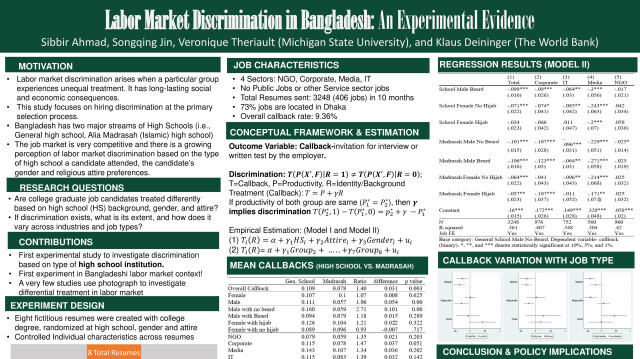
A joint research by Michigan State University and the World Bank exposed significant evidence of discrimination in Bangladesh's labor market against college graduates with madrasah backgrounds and candidates wearing religious attire.
A research endeavor conducted jointly by Michigan State University and the World Bank has brought to light significant evidence of discrimination within Bangladesh's labor market. Titled "Labor Market Discrimination in Bangladesh: An Experimental Evidence from the Job Market of College Graduates," the study scrutinized the issue of discrimination against university graduates with religious high school (madrasah) backgrounds, as well as bias based on religious attire and, to a limited extent, gender within the Bangladeshi job market. Despite sharing the same curriculam as general high school students and being subject to the same university entrance exam, discrimination arises solely because madrasah students study additional religious subjects such as Quran, Hadith, Fiqh, and Arabic.
Employing a rigorous experimental design, the researchers prepared eight fictitious resumes (CVs) for both male and female candidates, all possessing undergraduate degrees from Dhaka University. Within each gender group, two candidates had a general high school background, while the other two had attended Islamic high schools. Additionally, each gender group featured candidates with and without religious attire. All other qualifications were deliberately kept consistent across the CVs. Over a period of 10 months, 3,248 job applications were made for 406 positions using 8 different CVs, which were then submitted to various sectors, and callback rates for interviews or written tests were recorded.
The findings unveiled a disconcerting reality of discrimination against graduates with madrasah backgrounds, even when their qualifications paralleled those from general high schools. Male candidates with a madrasah background, who do not display any religious symbols such as a beard and cap, are required to apply to at least 171% more job positions in order to receive a comparable number of interview invitations compared to candidates from general high school backgrounds. Alarmingly, this form of discrimination was pervasive across all four sectors analyzed.
The research also shed light on the influence of religious attire in hiring decisions. Candidates wearing beards and caps or hijabs encountered varying degrees of bias. Notably, male candidates with beards faced more discrimination compared to their female counterparts wearing hijabs. The media and corporate sectors were found to exhibit the highest levels of discrimination based on religious attire, while the IT sector displayed no noticeable bias.
Gender-based discrimination was less noticeable overall across various job sectors. Notably, in certain fields like NGOs, female candidates were often favored. Nevertheless, discernible discrepancies emerged in lower-paying job positions and roles requiring extensive client-interactions, where female candidates experienced a higher level of preference.
By: Khan Muhammad An Nazmus Saqib
Hello, the comments you share on our site are a valuable resource for other users. Please respect other users and different opinions. Do not use rude, offensive, derogatory, or discriminatory language.
The floor is all yours.








